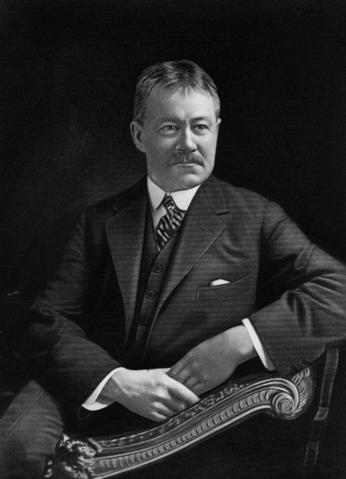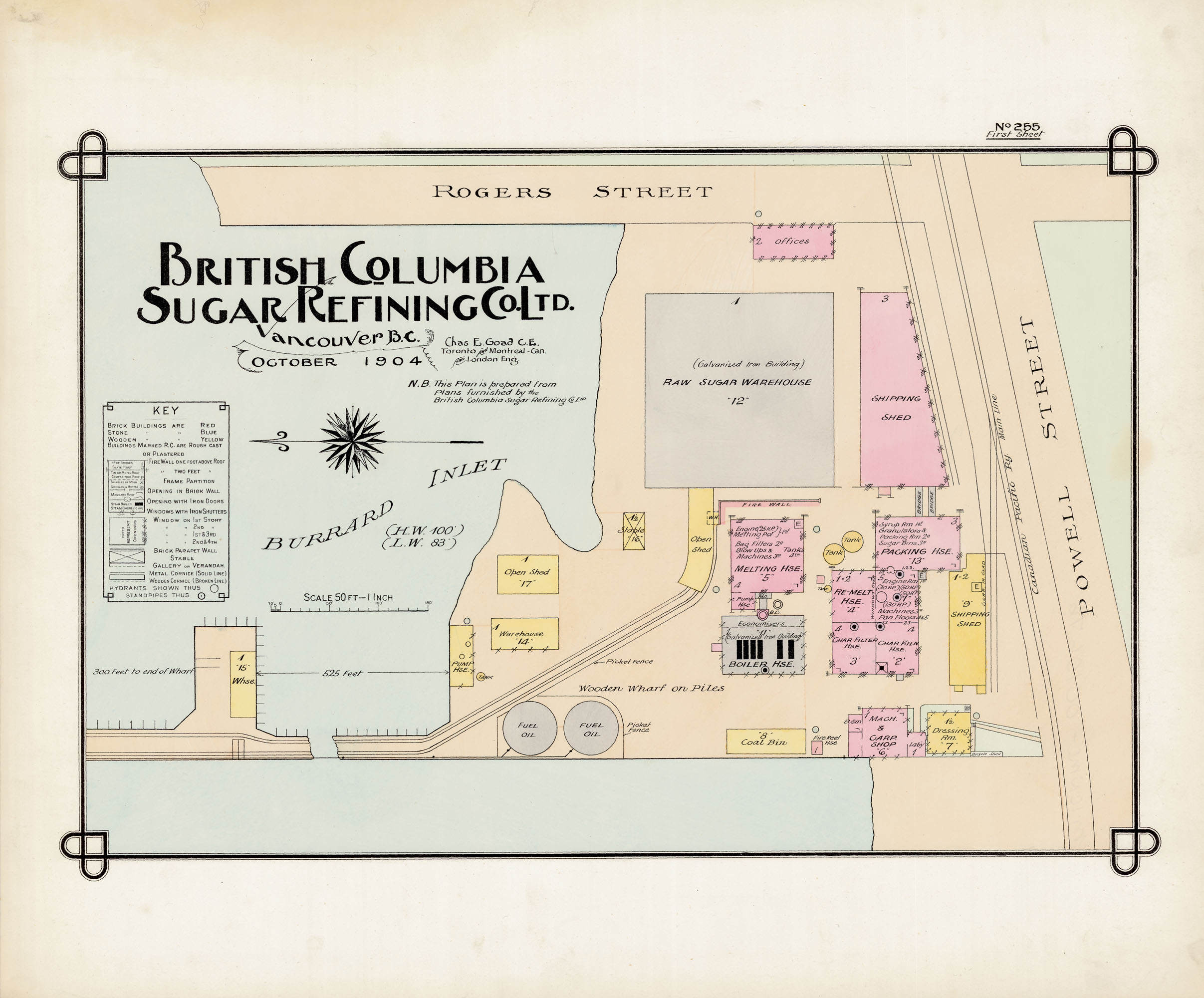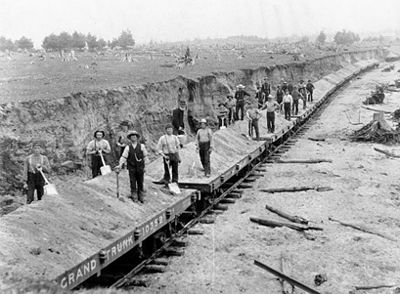Benjamin Tingley (B.T.) Rogers, businessman (born 21 October 1865 in Philadelphia, PA; died 17 June 1918 in Vancouver, BC). B.T. Rogers was an industrialist who founded the British Columbia Sugar Refining Co. Ltd. in Vancouver in 1890. Now known as Rogers Sugar Inc., the company is the holding company of Lantic Inc. (See also Sugar Industry.)

Early Life
B.T. Rogers was the second child of Samuel Blythe Rogers and Clara Augusta (née DuPuy). His father had worked in a Philadelphia sugar company before becoming the owner and president of a large cane refinery in New Orleans. B.T. Rogers enjoyed a privileged upbringing and had family ties to prominent businessmen. He studied at the prestigious Phillips Academy in Andover, Massachusetts. Between 1881 and 1883, he gained experience as a chemist in his father’s sugar refinery.
B.T. Rogers’s father died in February 1883. Following his father’s death, Rogers relocated to New York and through his father's personal connections found employment at the sugar refinery, Havemeyer & Elder. The refinery’s chemist, Paul Casamajor was pioneering a new system of sugar filtration using fine sawdust. In 1887, a fire brought the Havemeyer plant into ruins and later that year Casamajor died from a heart attack. Rogers subsequently became involved with the New York firm Casamajor Filter Co., where he was one of the directors and became secretary.
B.C. Sugar Refining Company
In 1889, B.T. Rogers went to Montreal to supervise the installation of new filter presses at the Canada Sugar Refining Company. (See also Redpath Sugar.) He saw an opportunity to compete with eastern sugar refiners and establish his own enterprise in the west coast. At the time, raw sugar crops could be sourced from sugar plantations of the East Indies (now Southeast Asia), including the Philippines and Java. Vancouver was a convenient location for a new refinery as raw sugar could be processed as soon as it arrived by ship, reducing travel time and transport cost. (See also Sugar Industry.)
With the help of Lowell M. Palmer, a supplier of wooden sugar barrels in New York, Rogers met with Canadian Pacific Railway (CPR) executives in January 1890. With the support of the CPR, Rogers sent his proposal for a sugar refinery to the Vancouver City Council. The young city was eager for new business, and the council adopted a sugar refinery by-law with revisions to Rogers' initial proposal. The council particularly agreed to exempt the refinery from taxes on the condition that Rogers did not employ Chinese labour. (See also Taxation in Canada; Chinese Canadians.) Rogers conceded to the council.
At 24 years of age, Rogers established himself as the managing director of the British Columbia Sugar Refining Company, which was incorporated on 27 March 1890. He placed the company’s first consignment of imported sugar. In August, a cargo of 1,000 tons of raw sugar was shipped from the Philippines initiating direct trade between Manila and Vancouver. (See also International Trade.) The refinery started operations with a daily capacity of 100 barrels. By January 1891, it had run its first melt, offering granulated sugar to the public later that month.
The company faced several challenges. There was fierce competition from business interests in eastern Canada. Merchants in Victoria also began selling imported sugar from China at reduced prices (see Imports to Canada).
Did you know?
To compete with imported sugar, Rogers released advertisements that used stereotypes and false information about Chinese labourers and imported products from Hong Kong. These adverts questioned the quality and cleanliness of imported sugar. (See also Anti-Asian Racism in Canada.)
Later Years
B.T. Rogers tightly controlled the refinery’s supply chain, which he expanded to include the manufacturing of goods like barrels, which were used in the production process. In 1897, he took over as company president. By 1899, the company was reorganised and a holding firm was set up, while the original sugar refining company continued operations.

Towards the turn of the 20th century, the company was in frequent conflict with the Canadian government over the levies associated with imported articles (see Taxation in Canada; Imports to Canada). B.T. Rogers then sought new sources of sugar cane. Between 1905 and 1907, he managed a sugar cane plantation in Fiji, which secured the company's raw materials. However, the supply was inadequate despite hiring indentured labour.
In 1910, the company registered its Canadian trademark B.C. Sugar Refinery—Rogers. A few years later its flagship product, Rogers' Golden Syrup, was created using a by-product of refined sugar cane.
Rogers enforced strict authority over the refinery. In 1917, he refused to deal with workers who demanded higher wages and did not recognize their union (see Labour Organization). The management hired private detectives and strikebreakers in an effort to break the prolonged strike. That same year, the company was also under government scrutiny for price fixing. Nevertheless, the cane sugar refinery continued to be fairly profitable for Rogers, who managed to expand operations.
Personal Life
T. Rogers relocated to Vancouver in 1891, but only became a British subject in 1906. (See also British Subject Status.) On 1 June 1892, he married Mary Isabella Angus, whose uncle was Richard Bladworth Angus of the CPR. Rogers and Mary had four sons (all of whom served as president of the sugar refining company) and three daughters.
B.T. Rogers died in his Vancouver mansion as a result of cerebral hemorrhage in June 1918.
Legacy
In his lifetime, B.T. Rogers was on the board of the Vancouver General Hospital, served as the chairperson of the British Columbia branch of the Canadian Manufacturers' Association, and was a member of the Royal Vancouver Yacht Club, where he was Commodore from 1912 to 1918.
His two estate mansions, “Gabriola” on Davie Street (1901) and “Shannon” (1925) on Granville, were designated heritage properties in Vancouver.
Rogers Sugar Inc. merged with Lantic Sugar Limited in 2008. Rogers Sugar is now the holding company of Lantic Inc., a Canadian producer of sugar and sweetener products. The Rogers name can still be found on products produced by Lantic Inc and a refinery still operates in Vancouver.

 Share on Facebook
Share on Facebook Share on X
Share on X Share by Email
Share by Email Share on Google Classroom
Share on Google Classroom




_IMO_9785756,_Maasmond_pic.jpg)








